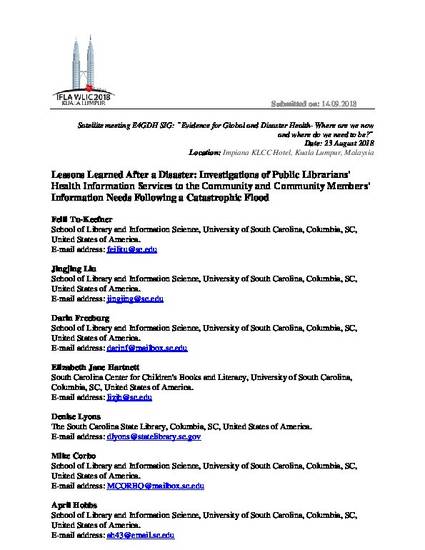
Article
Lessons Learned After a Disaster: Investigations of Public Librarians’ Health Information Services to the Community and Community Members’ Information Needs Following a Catastrophic Flood
Proceedings of International Federation of Library Associations and Institutions satellite meeting, Kuala Lumpur
(2018)
Abstract
In times of crisis, public libraries, in addition to health, fire, and police departments, are community outreach centers and sources of credible information. In October 2015, several counties in the state of South Carolina in the United States of America experienced catastrophic flooding that caused severe damage. Situation-specific research was conducted to investigate public libraries’ value to theircommunities in providing critical information services, as well as the libraries’ legitimacy as partnersof public health agencies. The research framework is one recommended by public health experts for risk communication preparedness and implementation during pandemic influenza. In 2015, a casestudy investigated 1) public librarians’ use of multiple channels and technology for information distribution and services; and 2) public libraries’ collaboration with multi-level agencies to facilitateemergency response and recovery. In 2017, a survey study examined community members’ use of disaster information sources and evaluation of the information’s credibility during and after the 2015flooding. The results show that the public libraries in the areas affected by flooding created disaster-recovery centers, illustrating the libraries’ value in facilitating emergency response and recovery.However, the findings also show public librarians were not fully prepared to provide disaster and health information for adult users, especially through online venues. Even though most of the community members in the 2017 survey study indicated that it was easy or very easy to find information, some of them did not use any credible information resources either during or after the disaster. It is recommended that public libraries provide reliable, user-friendly disaster and health digital resources for adult users. Public librarians can use social media network sites, such as Facebook and Twitter, to increase awareness of these library resources and to distribute real-time messages of interest.
Keywords
- Disaster Preparedness,
- Health Information,
- Natural Disasters,
- Public Libraries,
- Community Engagement
Disciplines
Publication Date
2018
DOI
http://library.ifla.org/2320/1/s11-2018-tu-keefner-en.pdf
Citation Information
Feili Tu-Keefner, Jingjing Liu, Darin Freeburg, Elizabeth J Hartnett, et al.. "Lessons Learned After a Disaster: Investigations of Public Librarians’ Health Information Services to the Community and Community Members’ Information Needs Following a Catastrophic Flood" Proceedings of International Federation of Library Associations and Institutions satellite meeting, Kuala Lumpur (2018) Available at: http://works.bepress.com/darin_freeburg/17/
Creative Commons license

This work is licensed under a Creative Commons CC_BY International License.
